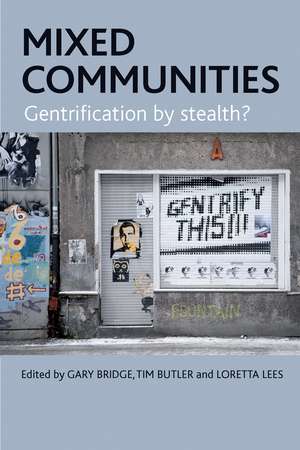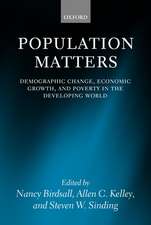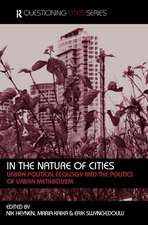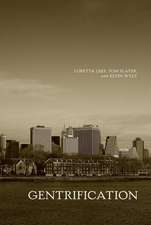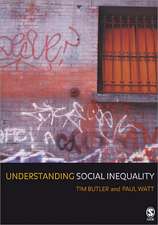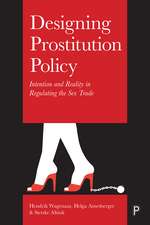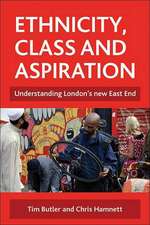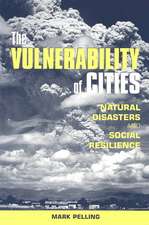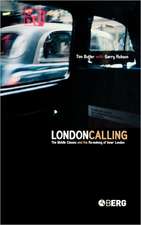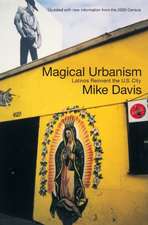Mixed Communities – Gentrification by Stealth?
Autor Gary Bridgeen Limba Engleză Paperback – 30 sep 2012
Encouraging social and class diversity in neighborhoods has been a major goal of urban policy and planning in a number of different countries. Mixed Communities draws together case studies by a range of international experts to assess the impacts of social mix policies and the degree to which they might represent stealth gentrification, as well as their relationship to wider social, economic, and urban change. From the perspectives of researchers, policy makers and planners, and the residents of the communities themselves, this volume draws on lessons from international comparisons.
Toate formatele și edițiile
| Toate formatele și edițiile | Preț | Express |
|---|---|---|
| Paperback (1) | 401.46 lei 43-57 zile | |
| Bristol University Press – 30 sep 2012 | 401.46 lei 43-57 zile | |
| Hardback (1) | 836.38 lei 43-57 zile | |
| Bristol University Press – 18 oct 2011 | 836.38 lei 43-57 zile |
Preț: 401.46 lei
Nou
Puncte Express: 602
Preț estimativ în valută:
76.83€ • 79.91$ • 63.43£
76.83€ • 79.91$ • 63.43£
Carte tipărită la comandă
Livrare economică 14-28 aprilie
Preluare comenzi: 021 569.72.76
Specificații
ISBN-13: 9781847424921
ISBN-10: 1847424929
Pagini: 384
Ilustrații: 17 figures, 12 tables
Dimensiuni: 156 x 234 x 21 mm
Greutate: 0.59 kg
Editura: Bristol University Press
ISBN-10: 1847424929
Pagini: 384
Ilustrații: 17 figures, 12 tables
Dimensiuni: 156 x 234 x 21 mm
Greutate: 0.59 kg
Editura: Bristol University Press
Notă biografică
Gary Bridge is professor of urban studies at the School for Policy Studies, University of Bristol. Tim Butler is professor of human geography at King’s College, London, and the Vincent Wright Visiting Professor of Sociology at Sciences Po, Paris. Loretta Lees is professor of geography at King’s College, London.
Cuprins
List of tables, figures and photographs
Acknowledgements
Notes on contributors
1. Introduction: gentrification, social mix/ing and mixed communities
Loretta Lees, Tim Butler and Gary Bridge
Part 1: Reflections on social mix policy
2. Why do birds of a feather flock together? Social mix and social welfare: a quantitative appraisal
Paul Cheshire
3. Social mix and urban policy
Patrick Le Galès
4. Mixed Communities and urban policy: reflections from the UK
Rebecca Tunstall
5. Gentrification without social mixing in the rapidly urbanizing world of Australasia
Wendy Shaw
Part 2: Social mix in liberal and neoliberal times
6. Social mixing and the historical geography of gentrification
David Ley
7. Social mix and encounter capacity—a pragmatic social model for a new downtown: the example of HafenCity Hamburg
Jürgen Bruns-Berentelg
Part 3: Social mix policies and gentrification
8. Mixed-income schools and housing policy in Chicago: a critical examination of the gentrification/education/’racial’ exclusion nexus
Pauline Lipman
9. Social mix as the aim of a controlled gentrification process: the example of the Goutte d’Or district in Paris
Marie-Hélène Bacqué and Yankel Fijalkow
10. Beware the Trojan horse: social mix constructions in Melbourne
Kate Shaw
Part 4: The rhetoric and reality of social mix policies
11. Social mixing as a cure for negative neighbourhood effects: evidence-based policy or urban myth?
David Manley, Maarten van Ham and Joe Doherty
12. Meanings, politics and realities of social mix and gentrification: a view from Brussels
Mathieu Van Criekingen
13. ‘Regeneration’ in interesting times: a story of privatisation and gentrification in a peripheral Scottish city
Sarah Glynn
14. HOPE VI: calling for modesty in its claims
James Fraser, James DeFilippis and Joshua Bazuin
Part 5: Experiencing social mix
15. The impossibility of gentrification and social mixing
Mark Davidson
16. Not the only power in town? Challenging binaries and bringing the working class into gentrification research
Kirsteen Paton
17. From social mix to political marginalisation? The redevelopment of Toronto’s public housing and the dilution of tenant organisational power
Martine August and Alan Walks
18. Mixture without mating: partial gentrification in the case of Rotterdam, the Netherlands
Talja Blokland and Gwen van Eijk
Afterword
Gary Bridge, Tim Butler and Loretta Lees
References
Index
Acknowledgements
Notes on contributors
1. Introduction: gentrification, social mix/ing and mixed communities
Loretta Lees, Tim Butler and Gary Bridge
Part 1: Reflections on social mix policy
2. Why do birds of a feather flock together? Social mix and social welfare: a quantitative appraisal
Paul Cheshire
3. Social mix and urban policy
Patrick Le Galès
4. Mixed Communities and urban policy: reflections from the UK
Rebecca Tunstall
5. Gentrification without social mixing in the rapidly urbanizing world of Australasia
Wendy Shaw
Part 2: Social mix in liberal and neoliberal times
6. Social mixing and the historical geography of gentrification
David Ley
7. Social mix and encounter capacity—a pragmatic social model for a new downtown: the example of HafenCity Hamburg
Jürgen Bruns-Berentelg
Part 3: Social mix policies and gentrification
8. Mixed-income schools and housing policy in Chicago: a critical examination of the gentrification/education/’racial’ exclusion nexus
Pauline Lipman
9. Social mix as the aim of a controlled gentrification process: the example of the Goutte d’Or district in Paris
Marie-Hélène Bacqué and Yankel Fijalkow
10. Beware the Trojan horse: social mix constructions in Melbourne
Kate Shaw
Part 4: The rhetoric and reality of social mix policies
11. Social mixing as a cure for negative neighbourhood effects: evidence-based policy or urban myth?
David Manley, Maarten van Ham and Joe Doherty
12. Meanings, politics and realities of social mix and gentrification: a view from Brussels
Mathieu Van Criekingen
13. ‘Regeneration’ in interesting times: a story of privatisation and gentrification in a peripheral Scottish city
Sarah Glynn
14. HOPE VI: calling for modesty in its claims
James Fraser, James DeFilippis and Joshua Bazuin
Part 5: Experiencing social mix
15. The impossibility of gentrification and social mixing
Mark Davidson
16. Not the only power in town? Challenging binaries and bringing the working class into gentrification research
Kirsteen Paton
17. From social mix to political marginalisation? The redevelopment of Toronto’s public housing and the dilution of tenant organisational power
Martine August and Alan Walks
18. Mixture without mating: partial gentrification in the case of Rotterdam, the Netherlands
Talja Blokland and Gwen van Eijk
Afterword
Gary Bridge, Tim Butler and Loretta Lees
References
Index
Recenzii
“This collection is the definitive analysis of today’s urban policy paradox: a friendly language of community and inclusion used to justify policies that threaten exactly what they name—social mix and diversity.”
"This volume is extremely useful for anyone hoping to get to grips with the complex and little-understood issues regarding social mix policy and gentrification."
